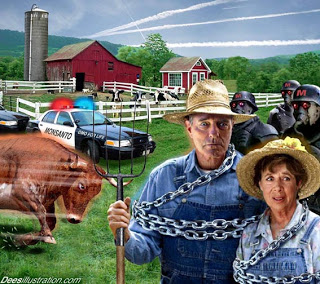Because Big Food makes Big Finance look like amateurs.
 |
| Dees Illustration |
Tom Philpott
Mother Jones
The Occupy Wall Street protests grew out of anger at the outsized power of banks. But as they’ve expanded nationwide, the uprisings have evolved into a kind of running challenge to the way power is concentrated in all aspects of our economy—concentrated into the hands of people with an interest in maintaining the status quo.
No doubt, the financial sector is a stunning example. This MoJo chart shows how the 10 largest banks came to hold 54 percent of US financial assets, up from 20 percent in 1990. As big banks gobbled smaller banks and became megabanks, they managed to extract more and more wealth out of the economy. Even after the epochal meltdown and bailout, the financial sector now claims fully a third of US corporate profits. They’ve invested a chunk of that windfall in what is probably Washington’s most formidable lobbying machine—which is precisely how they managed to slither away unscathed despite the economic carnage they caused.
But other economic sectors are similarly concentrated, and have a comparable grip on public policy. Consider the industry I cover. Our national food policy is both in desperate need of reform and utterly trapped under the heel of industry influence. So, as Occupy Wall Street evolves, food policy should be on the plate. Here are four reasons why:
 |
| AD |
1. The food industry is a big fat monopoly.
Agribusiness is concentrated to a point that would make a Wall Street master of the universe blush. Vast globe-spanning corporations, many of them US-based, dominate the industry.
Let’s start with “inputs,” the stuff farmers buy before they plant their crops. As of 2007, six companies owned 75 percent of the global pesticide market, and four companies sold half of the globe’s seeds, ETC Group reckons. Here’s the kicker: Three of them—Monsanto, Syngenta, and Dupont—are on both lists. The agrichemical makers have transitioned into seed barons, genetically engineering their major seed lines to resist their own herbicides.
Monsanto is an interesting case. In addition to being the planet’s largest seed vendor, with 23 percent of the market, it licenses its patented genetically modified traits to other companies. Think of the physical seed as the hardware and traits as the software. In the trait market, Monsanto holds a near monopoly: By 2007, according to ETC Group, 87 percent of the acreage dedicated to genetically engineered crops contained crops bearing Monsanto traits.
Okay, so farmers rely on a small handful of firms for their inputs. But it turns out the same thing holds true when they harvest and sell their crops. Just four companies—Cargill, Archer Daniels Midland, Bunge, and Louis Dreyfus—control up to 90 percent of the global trade in grain. In the United States, three of those firms process 70 percent of the soybeans and 40 percent of the wheat milled into flour. The bulk of corn and soy grown by US farmers ends up feeding animals in vast factories, and here, too, the consolidation is dramatic: Three companies now process more than 70 percent of all beef, and just four firms slaughter and pack upwards of 58 percent of all pork and chicken.
Finally, let’s look at the supermarkets. Walmart opened its first grocery-selling “superstore” in 1988. Today, it controls 2,750 superstores and more than a quarter of the US grocery market. As a result, the combined market share of the four largest grocery players has doubled, from less than 20 percent in 1992 to nearly 40 percent today.
And, despite acres of shelves groaning with thousands of products, only a few large companies stock supermarkets. By 2002, the USDA reported, four companies churned out 75 percent of breakfast cereal, 75 percent of snacks, 60 percent of cookies, and 50 percent of ice cream.
linkwithin_text=’Related Articles:’


Be the first to comment on "Foodies, Get Thee to Occupy Wall Street"